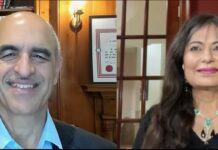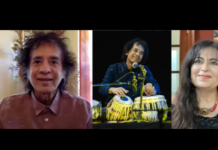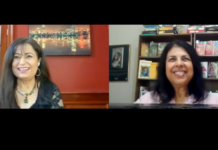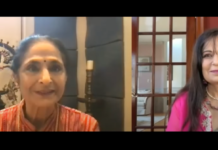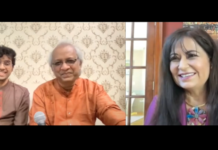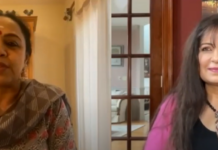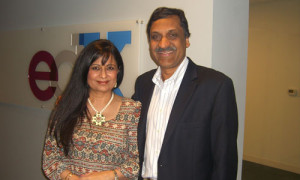
In this edition of Chai with Manju, we present an interesting glimpse into the life of Anant Agarwal, president of edX, a not-for-profit enterprise offering free online courses from the 32 global institutions of higher education and founded by MIT and Harvard University. Only within two years of its launch and with over two million students enrolled from 196 countries, edX has become a global phenomenon, or a journey that Agarwal describes as “like riding a rocket ship.”
Despite his extraordinary career that started with an electrical engineering degree from IIT Chennai, followed by computer science at Stanford, then MIT and now edX, Agarwal does not believe in destiny. He does concede, however, that timing and luck play a role in life but insists that while it may be raining diamonds “you must have your hands spread out for them to accidentally drop into your grasp.” Agarwal’s success is attributed to his hard work, great mentors and the fact that he never gives up. He enjoys building things and also has a passion for doing new and crazy things, be it building a chicken farm at home at the age of 13 or giving up the prestigious directorship of MIT’s computer science and artificial intelligence lab for an education, non-profit start-up. Not surprisingly, his best advice for other entrepreneurs is: “Shoot for the impossible.”
Anant AgarwalQ: It has been almost 2 years since the phenomenal launch of edX in May 2012, and the number of students have grown from 150,000 to two million. What has this journey been like for you?
Agarwal: It has been like riding a rocket ship. When we first started edX, we made a bold statement of educating a billion people. It seemed hyperbolic and now we believe that we can do that as we expand our access to education. We believe that education is a basic human right and everyone should be able get an education like the air we breathe. Today, we have 50 worldwide partners including many of the world’s greatest universities like Harvard, MIT, Berkeley, and IIT Bombay. We have 2 million students from 196 countries including 600,000 from the US and 250,000 from India. edX has also become a global open source platform adopted by entire countries to create nation-wide online learning infrastructures including China, France, Japan and the middle-east. edX has become quite a worldwide movement.
Q: You did electrical engineering at IIT Madras and then computer science at Stanford and have been an educator as well as an entrepreneur. You have also been in the Guinness Book of World Record for the largest microphone array. What drives you and of all the hats that you wear which one excites you the most?
A: I always like to do new and crazy things, and inspired by the book “Zen and the Art of Motorcycle Maintenance.” The journey is more important to me than getting there. One of the craziest things that I did was as a young kid of 13 in Mangalore when I decided to build a chicken farm. I had 40 chickens and would get up at 4 AM to collect eggs. I sold the eggs by making a deal with local restaurant. I suppose you could call this B2B!
Q: Tell us about growing up in Mangalore.
A: I was born in Lucknow and moved to Mangalore at the age of 6 months. My father was a pathologist and taught at Kasturba Medical College (part of the Manipal group) in Mangalore. While my mom was a home-maker, she was also a businesswoman, creating a home business by selling brass and stainless steel items from home which did extremely well. We are 3 brothers and we are into building things. We built a nursery at home and started grafting and selling rose bushes, bringing together science and nature.
Q: What was your childhood like? Who have been your mentors in life?
A: I have had many mentors as I grew up. While growing up, I looked up to a friend Avinash Mulky who was a few years older than me, and now a professor in IIM Bangalore. I learnt work ethic and trying to do everything to the best of your ability from him. Arunachalam Kumar, who was a medical student while I was in high school, was another friend and mentor. Through him I learned about idealism, interacting with and inspiring people, and doing crazy things. At one point, Kumar led an autorickshaw drivers strike in Mangalore to protest something that I now forget. I also learnt a lot from my 9th grade Math teacher, J. L. Saldanha, who is unfortunately no more. An extremely brilliant and dedicated teacher, and completely on his own time, he would give me complicated math problems to solve after class to challenge me.
Q: What are the memories of childhood which on hindsight might have sown the seeds of edX?
A: My high school St. Aloysius in those days conformed to the rather lenient SSLC standard which taught us relatively unchallenging material but somehow I managed to get into IIT. However, to my dismay I was one of two students out of 300 that failed the first physics midterm at IIT Madras (Chennai). One of the reasons was that I had little background in calculus-based physics and the instructor assumed this knowledge. This made a huge impact on me, and as I look back I feel that everyone should have access to high quality education, not just students that go to elite, rigorous schools in big cities. Perhaps that sowed the seeds for our vision to create edX, and to offer the best online education available to everyone in the world.
Q: What made you come to USA? Tell us about your journey and some of the challenges you faced.
A: After IIT, I wanted to do cutting-edge research so I applied to many universities in USA and came to Stanford in 1982. I was lucky that John Hennessy was my PhD advisor. Like other fresh-off-the-boat Indian students who arrived in the US in chappals with all their belongings in a suitcase, in the early days after coming here, I was low on money and feeling cold all the time. I would sleep with the temperature set at 80C. Times have changed. Today I like a sleep temperature of 62C.
Q: Tell us something about your personal life. How did you meet your wife, how many children do you have? What career choices have your kids made?
A: I met my wife Anu in Mumbai while doing an internship at the Tata Institute of Fundamental Research there. Anu was also doing an internship there. I really enjoyed her company and found her easy to converse with. She was also very pretty, and was one of the few people that laughed at my PJs (jokes). After I came to Stanford, she came to San Jose State University as a teaching assistant. We got married in the spring of 1983 at the San Jose Municipal Court so that we could get into nice married student housing at Stanford. We subsequently had a ceremony at a Hindu temple in San Francisco as per the wishes of our parents. We have two children: Akash and Anisha. Akash is a sophomore in college majoring in mechanical engineering and business management. Anisha is a freshman at Weston High.
Q: What do you think is your biggest strength?
A: I never give up.
Q: What are your weaknesses?
A: Surprisingly, I do not like change in my life. For example, I remember coming home one day and getting agitated when I noticed that my family had moved a picture on the wall to a new location. And I could definitely become a better listener.
Q: Do you have any regrets in life or with hindsight do you wish that you had done anything differently in life?
A: I could have done a lot of things better in life, but I tend not to look back.
Q: While researching about you, it seems that your life is very scientific. What is a perfect day of relaxationand fun for you?
A: I like to build things. One of my most favorite activities was building a tree house for my kids 15 feet up in the air between a pair of trees. I also like eating greasy breakfasts in local diners.
Q: What is the best advice that you received in your life and what is the best advice that you would give to future entrepreneurs?
A: Shoot for the impossible. Never give up.
Q: How much role do you think destiny plays in success? Why was this the right time for edX to be successful?
A: I do not believe in destiny. It is all about making your own way. Luck does play a role, but you have to get yourself in a position to take advantage of lucky breaks. I always say even if it is raining diamonds, you must have your hands spread out for them to accidentally drop into your grasp.
Among other things the timing was right for edX. Although online learning has been around in various early forms for many decades, it was never popular or of high quality. Today, the basic technology elements are there. Cloud computing, social networks, and video distribution networks have come together in a perfect storm of technology to enable todays online learning.
Q: Where do you see yourself in 10 years?
A: In terms of my personal life, remember I do not like change. So I expect to see everything in my personal life exactly as it is today. The same house, the same friends, the same colleagues, of course with the usual advancements due to the natural course of things.
However, in terms of what I do in research, education or the startup world, I tend not to think beyond a few years. These worlds are completely unpredictable and I try not to plan more than 2 or 3 years out. For example, if soothsayers had told me in 2011 that I would turn on a dime and throw myself into an education non-profit startup company, after stepping down from the directorship of MIT’s computer science and artificial intelligence lab and giving up all my computer architecture research, I would have told them they were nuts.
Q: A question came for you from a Facebook user: I wonder what he (Agarwal) thinks about introducing technology like video games in education?
A: Lecture was theater, but the future is in games. I think it is important that we make education engaging and fun. At edX we are trying to do so through make video game-like approaches to learning. For example, we have simulation based virtual laboratories on edx.org. Here learners can create or play with circuits or molecules or mathematical graphs much like they would with virtual legos. Similarly, the assessments and virtual labs provide game-like instant feedback — the edx green checkmark has become somewhat of a cult symbol on edx and has reached meme status on the web! Learners are telling us that they go to bed at night dreaming of the green checkmark!
Here are Agarwal’s answers to our instant rapid fire questions:
Favorite Movie: Sting and Teesri Maanzil
Favorite Singer: Kanye West
Favorite Food: Banana chips
Favorite Travel Destination: Caribbean
Favorite Quote: “Hitch your wagon to a star.” –Ralph Waldo Emerson
Favorite Book: Invisible Man by H. G. Wells. Although the books by Dennis Lehane have come close.
What was the happiest moment of your life: Birth of my children.
Saddest moment: When children leave home for college.
What is the one thing that you dislike in others: Not keeping your word.
Who do you admire the most: Warren Buffet for his simple living. When asked why he had a house with only 3 bedrooms, he famously said: I need only one, how many do you?
Last word on Chai: JDI. Don’t think too hard, just do it.




